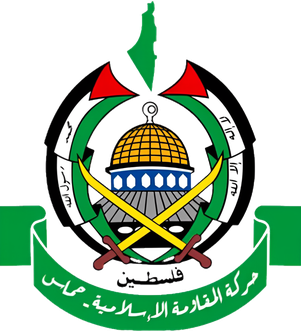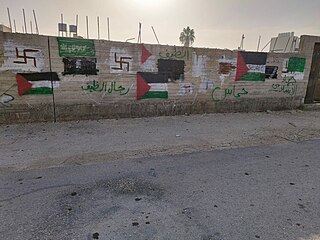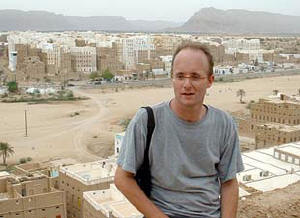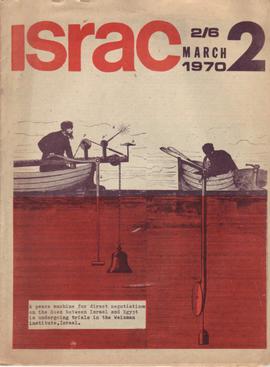
Hamas, an acronym of its official name, the Islamic Resistance Movement, is a Palestinian Sunni Islamist political and military organization governing the Gaza Strip of the Israeli-occupied Palestinian territories. Headquartered in Gaza City, it has a presence in the West Bank, the larger of the two Palestinian territories, in which its secular rival Fatah exercises control.

The Palestine Liberation Organization is a Palestinian nationalist coalition that is internationally recognized as the official representative of the Palestinian people. Founded in 1964, it initially sought to establish an Arab state over the entire territory of the former Mandatory Palestine, advocating the elimination of the State of Israel. However, in 1993, the PLO recognized Israeli sovereignty with the Oslo I Accord, and now only seeks Arab statehood in the Palestinian territories that have been militarily occupied by Israel since the 1967 Arab–Israeli War.

The Israeli–Palestinian conflict is an ongoing military and political conflict in the Levant. Beginning in the mid-20th century, it is one of the world's longest-continuing conflicts. Key areas of the conflict include the status of Jerusalem, Israeli settlements, borders, security and water rights, as well as Palestinian freedom of movement and the Palestinian right of return.
Palestinian refugees are citizens of Mandatory Palestine, and their descendants, who fled or were expelled from their country over the course of the 1947–1949 Palestine war and the Six-Day War. Most Palestinian refugees live in or near 68 Palestinian refugee camps across Jordan, Lebanon, Syria, the West Bank and the Gaza Strip. In 2019 more than 5.6 million Palestinian refugees were registered with the United Nations.
Issues relating to the State of Israel and aspects of the Arab–Israeli conflict and more recently the Iran-Israel conflict occupy repeated annual debate times, resolutions and resources at the United Nations. Since its founding in 1948, the United Nations Security Council, has adopted 79 resolutions directly related to the Arab–Israeli conflict as of January 2010.
The Council for the National Interest ("CNI") is a 501(c)(4) non-profit, non-partisan anti-war advocacy group focused on transparency and accountability about the relationship of Israel and the United States and the impact their alliance has for other nations and individuals in other Middle East countries. Based in the United States and most active during the 2000s decade, the Council has highlighted Israel's disposition towards its neighbors, and how Middle Eastern nations, Palestinian rights and other aspects of Middle East life & relations are impacted by the Israel's policies and its financial, trade, and military relationships with the US. They have focused on popular sentiment and perceptions in the US and the between the two countries. They highlight how these policies have impacted the fate of Palestine and, treatment of Muslims within the US since the 1990s.

The 1978 South Lebanon conflict began after Israel invaded southern Lebanon up to the Litani River in March 1978, in response to the Coastal Road massacre near Tel Aviv by Lebanon-based Palestinian militants. The conflict resulted in the deaths of 1,100–2,000 Lebanese and Palestinians, 20 Israelis, and the internal displacement of 100,000 to 250,000 people in Lebanon. The Israel Defense Forces gained a military victory against the Palestine Liberation Organization as the latter was forced to withdraw from southern Lebanon, preventing it from launching attacks on Israel from across its land border with Lebanon. In response to the outbreak of hostilities, the United Nations Security Council adopted Resolution 425 and Resolution 426 on 19 March 1978, which called on Israel to immediately withdraw its troops from Lebanon and established the United Nations Interim Force in Lebanon (UNIFIL).

Beginning in the mid 2000s, the military and diplomatic corps of the Russian Federation has had various contacts and relations with entities on both sides of the Iran–Israel proxy conflict. This is a component of Russia's broader foreign policy across the entire Middle East region.

Rashid Ismail Khalidi is a Palestinian-American historian of the Middle East and the Edward Said Professor of Modern Arab Studies at Columbia University. He served as editor of the Journal of Palestine Studies from 2002 until 2020, when he became co-editor with Sherene Seikaly.

Robert Malley is an American lawyer, political scientist and specialist in conflict resolution, who was the lead negotiator on the 2015 Iran nuclear deal known as the Joint Comprehensive Plan of Action (JCPOA).

The Arab Peace Initiative, also known as the Saudi Initiative, is a 10 sentence proposal for an end to the Arab–Israeli conflict that was endorsed by the Arab League in 2002 at the Beirut Summit and re-endorsed at the 2007 and at the 2017 Arab League summits. The initiative offers normalisation of relations by the Arab world with Israel, in return for a full withdrawal by Israel from the occupied territories, with the possibility of comparable and mutual agreed minor swaps of the land between Israel and Palestine, a "just settlement" of the Palestinian refugee problem based on UN Resolution 194, and the establishment of a Palestinian state with East Jerusalem as its capital. The Initiative was initially overshadowed by the Passover massacre, a major Palestinian attack that took place on 27 March 2002, the day before the Initiative was published.
The ideology of Hezbollah has been summarized as Shiite radicalism. Hezbollah was largely formed with the aid of pro-Iran Khomeinists during the early 1980s in order to spread the ideology of the Iranian revolution and follows a distinct version of Twelver Shia political theory of "Velayat-e-faqih" developed by the Iranian cleric Khomeini.

The Arab–Israeli conflict is the phenomenon involving political tension, military conflicts, and other disputes between various Arab countries and Israel, which escalated during the 20th century. The roots of the Arab–Israeli conflict have been attributed to the support by Arab League member countries for the Palestinians, a fellow League member, in the ongoing Israeli–Palestinian conflict; this in turn has been attributed to the simultaneous rise of Zionism and Arab nationalism towards the end of the 19th century, though the two national movements had not clashed until the 1920s.

Palestinian fedayeen are militants or guerrillas of a nationalist orientation from among the Palestinian people. Most Palestinians consider the fedayeen to be "freedom fighters", while most Israelis consider them to be "terrorists".
Sara M. Roy is an American intelectual political economist and scholar. She is a Senior Research Scholar at the Center for Middle Eastern Studies at Harvard University.

Racism in the Palestinian territories encompasses all forms and manifestations of racism experienced in the Palestinian Territories, of the West Bank, Gaza, and East Jerusalem, irrespective of the religion, colour, creed, or ethnic origin of the perpetrator and victim, or their citizenship, residency, or visitor status. It may refer to Jewish settler attitudes regarding Palestinians as well as Palestinian attitudes to Jews and the settlement enterprise undertaken in their name.

Jonathan Cook is a British writer and a freelance journalist formerly based in Nazareth, Israel, who writes about the Israeli–Palestinian conflict. He writes a regular column for The National of Abu Dhabi and Middle East Eye.

The Madrid Conference of 1991 was a peace conference, held from 30 October to 1 November 1991 in Madrid, hosted by Spain and co-sponsored by the United States and the Soviet Union. It was an attempt by the international community to revive the Israeli–Palestinian peace process through negotiations, involving Israel and the Palestinians as well as Arab countries, including Jordan, Lebanon and Syria.

Matzpen is the name of a revolutionary socialist and anti-Zionist organisation, founded in Israel in 1962 which was active until the 1980s. Its official name was the Socialist Organisation in Israel, but it became better known as Matzpen after its monthly publication.












